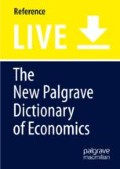Abstract
One has to distinguish the X-efficiency concept from the theory intended to explain it. As a concept X-inefficiency is similar to technical inefficiency. Leibenstein originated the concept of X-inefficiency because of a belief that there is nothing technical about the most substantial sources of non-allocative inefficiencies in organizations. At the time of the original article (Leibenstein 1966), it seemed that no available concept, such as organizational inefficiency or motivational inefficiency, implied all the elements that could be involved in non-allocative inefficiencies. Hence, the comprehensive term, ‘X-inefficiency’, was used.
This chapter was originally published in The New Palgrave Dictionary of Economics, 2nd edition, 2008. Edited by Steven N. Durlauf and Lawrence E. Blume
Bibliography
Frantz, R. 1987. X-efficiency: Theory, evidence, and applications. New York: Kluwer-Nyhoff.
Leibenstein, H. 1966. Allocative efficiency vs. ‘X-efficiency’. American Economic Review 56: 392–415.
Leibenstein, H. 1976. Beyond economic man. Cambridge, MA: Harvard University Press.
Leibenstein, H. 1982. The prisoner’s dilemma in the invisible hand: An analysis of intrafirm productivity. American Economic Review 72: 92–97.
Leibenstein, H. 1987. Inside the firm: The inefficiencies of hierarchy. Cambridge, MA: Harvard University Press.
Lewis, D. 1969. Convention: A philosophical study. Cambridge, MA: Harvard University Press.
Rapoport, A. 1970. N-person game theory. Ann Arbor: University of Michigan Press.
Schelling, T. 1960. The strategy of conflict. Oxford: Oxford University Press.
Ullman-Margalit, E. 1977. The emergence of norms. New York: Oxford University Press.
Author information
Authors and Affiliations
Editor information
Editors and Affiliations
Copyright information
© 2008 The Author(s)
About this entry
Cite this entry
Leibenstein, H. (2008). X-Efficiency. In: The New Palgrave Dictionary of Economics. Palgrave Macmillan, London. https://doi.org/10.1057/978-1-349-95121-5_1888-2
Download citation
DOI: https://doi.org/10.1057/978-1-349-95121-5_1888-2
Received:
Accepted:
Published:
Publisher Name: Palgrave Macmillan, London
Online ISBN: 978-1-349-95121-5
eBook Packages: Springer Reference Economics and FinanceReference Module Humanities and Social SciencesReference Module Business, Economics and Social Sciences
Publish with us
Chapter history
-
Latest
X-Efficiency- Published:
- 21 March 2017
DOI: https://doi.org/10.1057/978-1-349-95121-5_1888-2
-
Original
X-Efficiency Theory- Published:
- 26 November 2016
DOI: https://doi.org/10.1057/978-1-349-95121-5_1888-1

